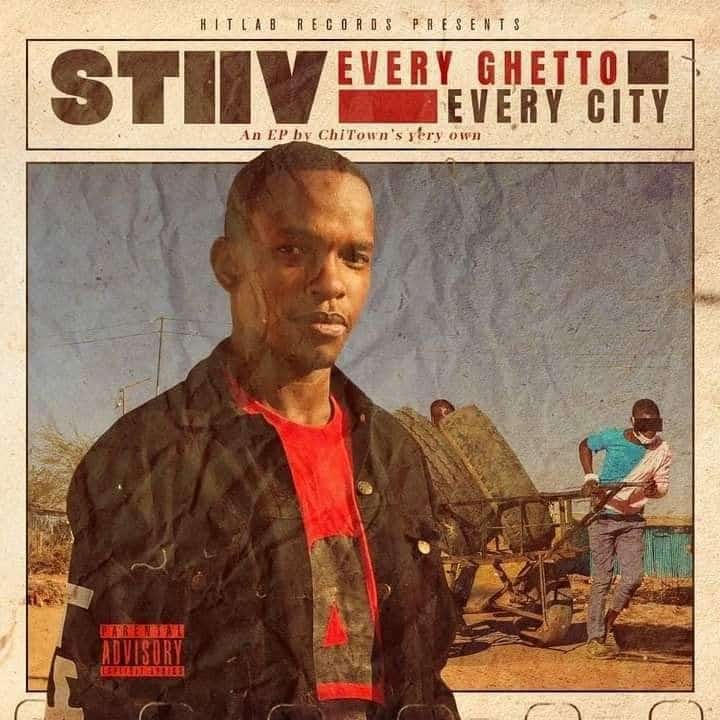BY BRANDON MWANZA AND TAKUDZWA KADZURA
Everyone loves kids until they start crying uncontrollably. It is like the sight of blood. People tend to hate seeing you bleed despite the love there is for you. It goes deeper as a philosophy on how human beings perceive the truth and how it shatters their authenticity and their preconceived notions of acceptable conventions and norms.
Because, like blood, it [truth] must remain confined in the skin. When you listen to the fiery and inimitable emcee Stiiv these sobering images become vivid.
Every line is laced with themes rarely talked about in detail and in a manner that is unfiltered. This being the very essence of genuinely empowering art.
The Chitungwiza-based rapper emerged on the scene with intense literature in his debut LP Letter To Samantha. His rap manifestation is at times larger-than-life; yet realistically incendiary.
The new EP Every Ghetto Every City is an extension of the beauty of his bleeding pen. The track Paunochema, the second on the EP, is an immediate favorite thanks to Rayo’s production whose genius managed to bandage the bleeding wound.
That is what basically works with artists like Stiiv and that is what is not there in the industry. People are not comfortable where blood spills just like when kids cry.
The rap that Stiiv brings to the table is heavy with the ghetto that they always masquerade and hoodwink the masses to create an impression. But do they really like the ghetto in every city?
The blood and tears in the unending dormitory city of Chitungwiza embody the totality of literature inked in Stiiv’s music.
He poignantly, with an enviable flair of artistically incisive precision, addresses commonplace but deeply hurtful societal issues like depression, drug abuse, religion, familial dysfunction, and the economics of inequality in new offering Every Ghetto Every City.
We needed the story from the writer’s perspective, and so this is what Stiiv had to say to us about the 4-track extended play,
“On the first listen, I agree that patience might run out in you or surprise you unlikely. I mean, the whole project might leave you disappointed by specifics but look, that’s okay; it’s the second listen that I [am] counting on. However, I’m hoping everyone caught up on the first strike, and that’s amazing as well. Listening [attentively and patiently] is more dreadful I know; trying to reconcile yourself to the writer’s state of mind. But here’s the point.…”
The writer’s perspective
Stiiv gave us an apt breakdown of the song and here is what he says:
Track 1: Rugare
“The opening lines ‘tipeiwo silence apa mungatiudza chii poverty?....…’ are confrontational, seeking empathy as the writer acknowledges how he’s no different from the other individual in a situation. In the same tone he seems to brag about how the struggle takes you down to earth. The lessons. It is the opening four lines and the hook that really delve into the core of the music. I tried three verses and two hooks for this beat. Glad this one worked.”
Track 2: Paunochema
“This is the first verse I wrote this year. Before the beats came I was experimenting with a new style. I could not find a replacement verse for this beat when it came through. I understood the task on this classic that shared an important position in Zimbabwean music. I won’t hesitate to say Africa. I’m impressed by how careful the song evaded disappointment.”
Track 3: Holy Water
“Interesting enough I had replacement verses for every song save for Paunochema. But this song is the paradigm shift to the whole EP. In an aim for clarity, the writer held a sword at the higher power and the African definition of truth. Less rhyming sentences I might say. The rhymes are concealed spaciously, sometimes exerted in tone. It’s a good thing the writer used profanity. It is a question for clerics. Wait - the beat switches on the second hook to the second verse could take over as the most artistic moment on the EP.”
Track 4: Level
“The visuals are out. And directed by DeeMak of Make Ent. Dope experience, really. Gruesome choice of words on the writer’s part.”
Every Ghetto Every City is available on Audiocus, a homegrown growing media streaming platform that portends massive positive changes to Zimbabwe’s music industry.
This is what Stiiv had to say about Audiocus:
“The idea with Digital Streaming Platforms [DSPs] especially our locally developed engines is to help drive the commercial value for African artists. In our motherland, the physical music copies have been outwitted by piracy and payola.
“Now what we are left with is a complete disconnect between the musician's creative legacy and the ones he or she is set to serve. I believe that anybody can buy music just as regular as they buy a new t shirt, phone even food.
“Our gift-wrap as creatives must be lucrative for fans to get in tune with whatever we are doing in our business. Such developments have yielded success beyond. We can do it as well.”
And of course, we thank the legendary producer Rayo Beats for making this EP a true masterpiece it is; exquisite artistry. There is a ghetto in every city. And the stories are not that story, but still inspire strength and optimism all the more.
You can listen to Every Ghetto Every City by Stiiv via the Audiocus link below and share with us your thoughts on the project:
https://www.audiocus.com/album/1/stiiv/every-ghetto-every-city

















.jpg)





.jpg)
0 Comments